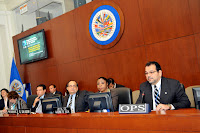 Venezuela’s national sovereignty is being
breached in that OAS Secretary General Almagro and the governments that support
him are acting in an arbitrary fashion. An all-encompassing condemnation of a
nation leading to organizational expulsion would be justified in the case of a
clear-cut systematic and flagrant violation of human rights. An example of such
a clear-cut case is the government of the Philippines, whose president, Rodrigo
Duterte, has been lauded by President Donald Trump, the same president who
supports measures against Venezuela in the OAS. Similarly, the Mexican
government endorses OAS resolutions against Venezuela, but what about the 43
students assassinated (or disappeared) in Iguala with apparent police
complicity, or the 14 journalists who have been assassinated in the country
over the last 12 months without a single arrest? And if Almagro’s call for
general elections in Venezuela on grounds of Maduro’s sagging popularity is
taken seriously, then the same demand should be applied to Brazil, where
President Michel Temer’s popularity has reached 5 percent, or Mexico, whose
president Enrique Peña Nieto has an approval rating of 17 percent.
Venezuela’s national sovereignty is being
breached in that OAS Secretary General Almagro and the governments that support
him are acting in an arbitrary fashion. An all-encompassing condemnation of a
nation leading to organizational expulsion would be justified in the case of a
clear-cut systematic and flagrant violation of human rights. An example of such
a clear-cut case is the government of the Philippines, whose president, Rodrigo
Duterte, has been lauded by President Donald Trump, the same president who
supports measures against Venezuela in the OAS. Similarly, the Mexican
government endorses OAS resolutions against Venezuela, but what about the 43
students assassinated (or disappeared) in Iguala with apparent police
complicity, or the 14 journalists who have been assassinated in the country
over the last 12 months without a single arrest? And if Almagro’s call for
general elections in Venezuela on grounds of Maduro’s sagging popularity is
taken seriously, then the same demand should be applied to Brazil, where
President Michel Temer’s popularity has reached 5 percent, or Mexico, whose
president Enrique Peña Nieto has an approval rating of 17 percent.The relevant issues in Venezuela are not black and white for the reasons. Most important, the government’s actions have to be contextualized. For example, the use of tear gas against a peaceful demonstration which does not threaten public order has to be distinguished from a demonstration which is heading toward the downtown area near the presidential palace where violence is likely to ensue. The latter has occurred nearly on a daily basis over the last two months. In addition, the widespread violence by opposition brigades also on a daily basis throughout Venezuela, the numerous cases of destruction of public property ranging from ministries, to government vehicles to subway stations to public buses, need to be brought into the equation, and yet these actions have been largely ignored by Almagro and other critics of the Venezuelan government as well as the mainstream media. The devil is in the details, and in order to justify sanctions against Venezuela, each one of those details has to be explored in an objective manner.
There are credible arguments in favor and
against this year’s announced electoral agenda. The government, for instance,
points out that the opposition itself called for the holding of a national
constituent assembly and now they refuse to participate. Given the current
deadlock in Venezuela, the constituent assembly call has the potential to bring
together diverse sectors in order to solve concrete problems. On the other
hand, if it fails to reach beyond the hard-core Chavistas, it will only
aggravate an already critical situation. Similarly, the scheduling of
gubernatorial and state assembly elections for December of this year is open to
debate. On the one hand, those elections should have been held last December.
On the other hand, up until the National Electoral Council’s recent
announcement of the December 2017 date, the opposition had been demanding the
holding of state-wide elections, but now some of its leaders hint that they
will oppose participation.
An objective evaluation of the issue of
the state of Venezuelan democracy will undoubtedly come up with serious
breaches of democratic norms, but the government’s arguments are credible
enough to deny a black and white conclusion or blanket condemnation. That being
the case, the position assumed by those who call for the application of the OAS’s
Democratic Charter lacks validity.
Steve Ellner
Latin American Perspectives
Latin American Perspectives
Taken from https://venezueladialogue.com/
No comments:
Post a Comment